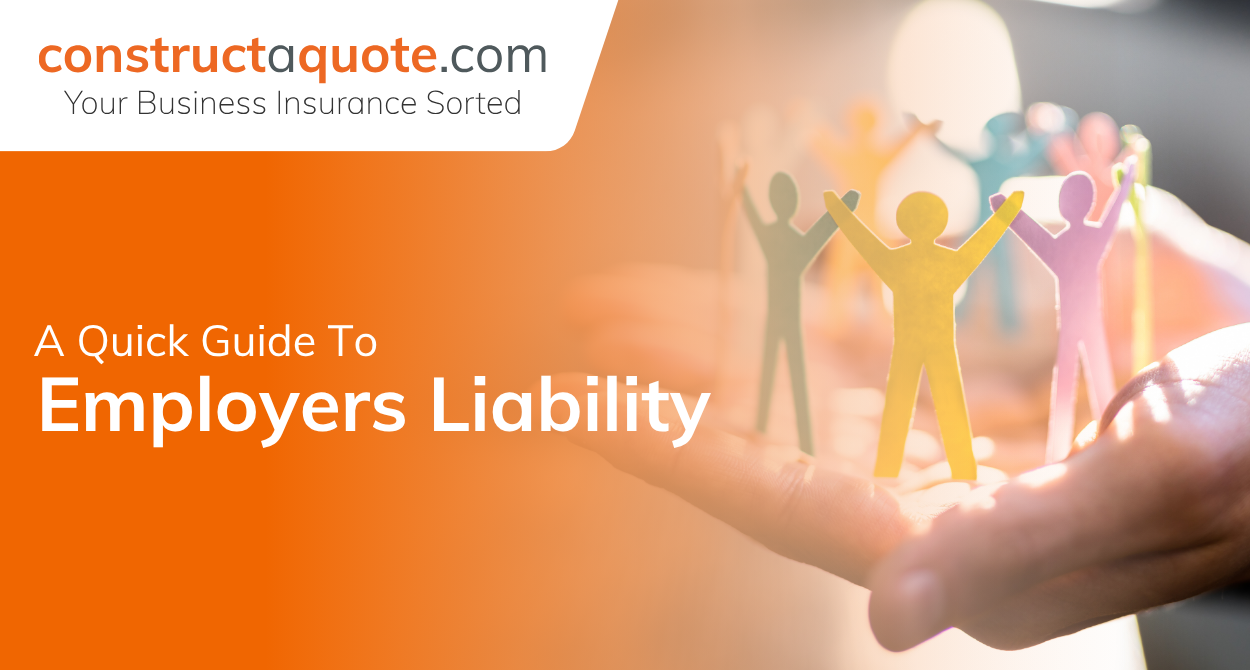by constructaquote - 21 January 2019


As a business owner you’re probably on the busy side so to save time and hassle we’ve put together a quick guide to employers liability to help you find out more.
Here are 9 important points to consider:
1. Apart from motor risks, employers’ liability insurance is the only other major form of liability insurance which is compulsory (if you have employees).
2. You will still need employers liability if you ’employ’ unpaid volunteers and work experience personnel.
3. You do not need employers liability insurance if your business is unincorporated and only employ close family. You can check out the definition of close family here.
4. If you don’t have Employers’ Liability Insurance, you face the prospect of paying a fine of up to £2,500 for every day you have traded without it.
5. By law, employers must have Employers’ Liability Insurance and be insured for at least £5 million. Most insurers automatically provide cover of at least £10 million.
6. Employers’ Liability Insurance enables businesses to meet the costs of damages and legal fees for employees who are injured or made ill at work through the fault of the employer.
7. Employees can also seek damages for injury to their personal property caused as direct result of their employment with you.
8. Employees injured due to an employer’s negligence can seek compensation, even if the business goes into liquidation or receivership.
9. Employers’ Liability Insurance must be taken out by all businesses with employees operating in England, Scotland, Wales and Northern Ireland.
While this guide cannot be used as a legal interpretation of Employers’ Liability Insurance, it can still provide you with a useful overview of its main features.
If your company’s based abroad
Under British law, employers’ liability insurance is not required if your employees are based abroad. It is important to remember, however, that other countries may have similar requirements in place. It is essential that you check if this is the case to ensure that your workers are protected.
Please note that if your employees are normally based abroad but spend more than 14 days continuously in Great Britain, or more than seven days on an offshore installation, by law you will still need employers’ liability insurance for them.
The right provider
You must make sure that you select an authorised insurer. If you don’t, you may be breaking the law by having invalid cover in place.
Reading the small print
When you take out employers’ liability insurance, you form an agreement with your insurer about the circumstances in which they will pay compensation. The policy will cover the specific activities that relate to your business.
However, you should watch out for a number of conditions that may restrict the amount of money your insurer has to pay, which you cannot agree and your insurer cannot impose. It is essential you check that you are both happy and fully informed regarding the level of cover and that your contract does not contain any conditions which fail to meet your expectations.
For example, your insurer cannot refuse to pay compensation simply because:
• You have failed to keep a record or provide information from those records to your insurer;
• You have not reported the incident or done anything else they told you to do;
• You have failed to provide reasonable protection for your employees against injury or disease.
However, this does not mean you can neglect your legal responsibilities to protect the health and safety of your employees. You are required to carry out risk assessments that comply with Health and Safety Executive guidelines. You must also take all reasonably practicable measures to protect your employees.
This is an important aspect of employers’ liability insurance because if your insurer believes that you have failed to meet your legal responsibilities, the insurer may choose to take legal action against you to reclaim the cost of compensation.
You’re not a fortune teller
No matter how much you’d like to, you cannot predict the future. Even when every practical measure has been taken by an employer, workplace accidents can and do still happen and therefore it is essential that the employee and employer are covered in these instances.
This guide is part of our series on employers liability insurance, for product information, links to more guides or to get a quote, visit our employers liability section here. You can also call our UK based sales team on 08081686868.

by Charlotte Houghton - 7 October 2020
by constructaquote - 6 October 2020
by Charlotte Houghton - 29 September 2020
by Charlotte Houghton - 24 September 2020